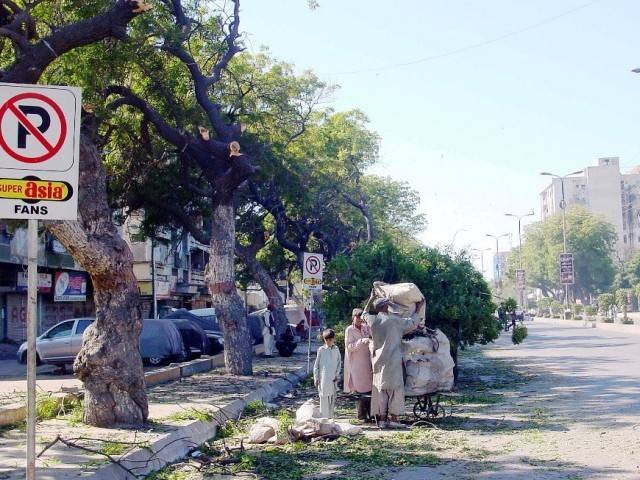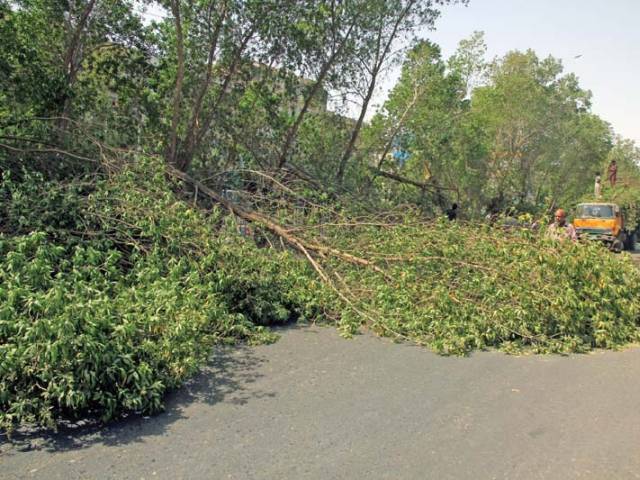Conocarpus continues to be favourite despite hazards
The foreign species has been invading Karachi since it was first brought in 2008

Trees being trimmed in Gulshan-e-Iqbal Karachi. PHOTO: FILE
Unfortunately, harmful effects of many plants planted without proper assessment are often perceived after they have been planted in every nook and corner of the city. A few decades ago, eucalyptus trees were planted across Karachi abundantly. Later, it was found that their deep roots were sucking the underground water at a faster pace than native species would do and the roots were also damaging road infrastructure, nearby buildings, and water and sewerage pipelines.
After the late acknowledgement of the harm caused by the eucalyptus, many trees of the species were cut down in the city. However, in 2008, another exotic species, conocarpus, was imported to the city and soon all roads and roundabouts of Karachi were filled with the fast-growing tree that required little water to be supplied by the authorities as it could satisfy its thirst from the underground water.
Similar to what happened with the eucalyptus, the harmful effects of the conocarpus were realised when it was outnumbering all other plant species in the city. Environmental and health assessments of the species revealed that its pollen grains caused respiratory diseases and it was suggested to reduce its number in the city.
Thousands of acres of forest land under encroachment, govt admits
However, they were not plucked out. Instead, another solution was opted for, which was to trim the plants in November and April, the seasons when the species bloom, so that the harmful effects of its pollen could be mitigated. However, that solution could also not be implemented effectively as the trimming of the trees present in every nook and corner of the city required a large workforce and finances which were probably not available.
However, conocarpus species still continues to be included in the forest department's nurseries. In the nursery situated in Model Colony, Malir, conocarpus along with other foreign species such as bottle palm, triangle palm, China palm, Malaysia palm and table palm can be observed. The local species present in the nursery include peepal, parkarsonia, babul, neem, laguna, pithecellobium dulce and gul-e-meher.
 Fallen conocarpus trees at University Road. PHOTO: FILE
Fallen conocarpus trees at University Road. PHOTO: FILEAccording to forestry expert Rafiul Haq, plantation of conocarpus plants should be avoided as focus should be on planting environment friendly flora.
The trend of planting foreign species in Karachi is not something new as in Ayub Khan's regime, seeds of mesquite plant were dispersed all over Sindh including Karachi. Karachi used to be way more barren in those days and therefore mesquite flourished in the city due to its ability to survive in the absence of water. The plant also offered fuel to the city residents as well as it helped against wind erosion.
Make necropolises clean, green
Few months ago, when University Road was being widened and renovated, the government spent a hefty amount in uprooting young date trees in rural Sindh, bringing them to Karachi and planting them between the tracks of the road from Hassan Square to Nipa Chowrangi. Environmental experts did not approve of the idea as Karachi's climate was not very conducive for the plantation of dates and the species did not provide enough shade in comparison to other trees.
Public demand conocarpus
Commenting on the proliferation of conocarpus in the city, Divisional Forest Officer Arif Ali Khokhar said 50% of Karachi's population demands conocarpus. He said the species is used to make a fence outside houses and other buildings. The tree can be easily trimmed into various shapes which makes it an ideal tree for beautification.
The officer added that since the tree excels in surviving in water-deficient soil, it should be planted in land where water is not easily available, whereas its plantation should be avoided in areas where there is abundance of water supply. The areas that face water shortages should plant conocarpus and the plants should be avoided in areas where there is abundant water supply.
The officer called for coordination between different government departments and private institutions to carry out the plantation work in the city effectively. There is a lot more space for coordination between the environment and forest departments, he said.
Olive Valley to be set up in city
The conocarpus plant is provided to the government departments and individuals at a very low cost, while the plants are given free-of-cost to educational institutes and law enforcement agencies.
A worker at a nursery of the forest department, 20-year-old gardener Altaf Hussain shared that even if the Sindh government does not sell conocarpus, people will still continue to buy it from private nurseries which usually sell the plants when they are six months to one year old. The public demands plants that grow easily in less water, he said.



















COMMENTS
Comments are moderated and generally will be posted if they are on-topic and not abusive.
For more information, please see our Comments FAQ